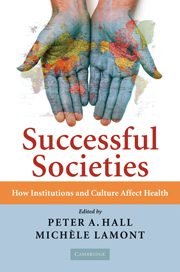Book contents
- Frontmatter
- Contents
- Contributors
- Preface
- Introduction
- 1 Population Health and the Dynamics of Collective Development
- 2 Social Interactions in Human Development: Pathways to Health and Capabilities
- 3 Health, Social Relations, and Public Policy
- 4 Population Health and Development: An Institutional-Cultural Approach to Capability Expansion
- 5 Responding to AIDS in Sub-Saharan Africa: Culture, Institutions, and Health
- 6 Responses to Racism, Health, and Social Inclusion as a Dimension of Successful Societies
- 7 Collective Imaginaries and Population Health: How Health Data Can Highlight Cultural History
- 8 Making Sense of Contagion: Citizenship Regimes and Public Health in Victorian England
- 9 The Multicultural Welfare State?
- 10 From State-Centrism to Neoliberalism: Macro-Historical Contexts of Population Health since World War II
- Bibliography
- Index
8 - Making Sense of Contagion: Citizenship Regimes and Public Health in Victorian England
Published online by Cambridge University Press: 05 June 2012
- Frontmatter
- Contents
- Contributors
- Preface
- Introduction
- 1 Population Health and the Dynamics of Collective Development
- 2 Social Interactions in Human Development: Pathways to Health and Capabilities
- 3 Health, Social Relations, and Public Policy
- 4 Population Health and Development: An Institutional-Cultural Approach to Capability Expansion
- 5 Responding to AIDS in Sub-Saharan Africa: Culture, Institutions, and Health
- 6 Responses to Racism, Health, and Social Inclusion as a Dimension of Successful Societies
- 7 Collective Imaginaries and Population Health: How Health Data Can Highlight Cultural History
- 8 Making Sense of Contagion: Citizenship Regimes and Public Health in Victorian England
- 9 The Multicultural Welfare State?
- 10 From State-Centrism to Neoliberalism: Macro-Historical Contexts of Population Health since World War II
- Bibliography
- Index
Summary
Successful societies protect and foster the health of their populations. This volume is premised, moreover, on the knowledge that health status depends on much more than the availability of health care for the treatment of individuals. Instead, much of health depends upon avoiding the dangers of social interaction, whether these take the form of contagion, environmental pollution, or unequal social status. International panics in recent years about that the next flu pandemic is only the latest in a long line of efforts to anticipate and prevent the spread of infection. The “epidemic of obesity” among children as well as adults is only one example of attention to social as well as physical conditions that lower the chances of individual good health and therefore societal success. The Public Health Agency of Canada, created in response to the 2003 scare about Severe Acute Respiratory Syndrome (SARS), is only one example of an institutional and structural reform based on the recognition that personal strategies for health cannot address threats affecting entire groups and populations.
Such long-standing concerns about intersections between individual and societal well-being is the domain of public health. International organizations seek to promote it, national governments institutionalize it, medical science debates it, and social science as well as epidemiology tracks its variable patterns over time and space. Studies of public health practices reveal them to be widely diverse.
- Type
- Chapter
- Information
- Successful SocietiesHow Institutions and Culture Affect Health, pp. 201 - 225Publisher: Cambridge University PressPrint publication year: 2009
- 1
- Cited by



